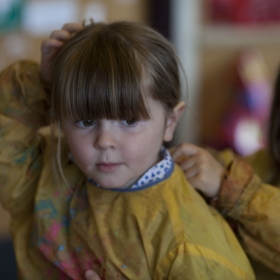Mindfulness
Published on isbi School News dated Thursday 8th of October 2015
Mindfulness Mindfulness is an ancient Buddhist practice which has relevance for our present day lives. It is about who we are, our view of the world and our place within it. Have you ever arrived at a destination and suddenly realised you don’t remember driving there? Many of us live our lives on auto pilot. We go through the motions of our everyday lives, we worry about the future or spend time going over an argument we had yesterday. Our minds wander elsewhere, and we end up eating without tasting, looking without seeing and talking without knowing what we are saying. Children often pay more attention to the present moment than adults do. Young children especially, will focus on a toy or a game, and they seem to enjoy taking time to really experience things like the feel of sand in their fingers or the sound of a familiar voice telling them their favourite story. However as they grow older, they inhabit a world of being told what to do, what time to go to school, to hurry up with an activity. This begins to establish the auto pilot way of living that we as adults are so familiar with, so they become less aware of what they are doing right now. At Kent College Prep School we tested this theory and asked our Nursery pupils what they were thinking as they were doing art work based on the story of "The Little Mermaid”. Comments included: "Ariel dancing with the Prince” "Ariel’s fishtail” "The Prince was about to sink” "Mermaids swimming in the sea” "I don’t know” "Having a lovely day at school” We then asked our Year 5 girls the same question whilst they were investigating facts about Viking longships. Here are some of their responses: "Having melted marshmallows when I get home.” "That I forgot to take the rabbit out of the hutch this morning and I am wondering how he is getting on.” "Drama club tonight - I hope that it goes well.” "I’m looking forward to watching the Year 6 production.” "Who I am going to be playing with at lunchtime.” "If my Viking drawing is going to be good enough.” "What’s for lunch?” Ask your children what they ate for dinner last night. You may be surprised that they may not remember. Being in the present moment can help us all to feel happier and cope better with our lives. Mindfulness is about respecting and not judging ourselves – it is about accepting who we are. Mindfulness also involves keeping our minds clear of thoughts, so that we can focus on what is happening now, without being distracted. Being mindful is simply about paying attention to those things in the present moment that we so often ignore, the rich taste of coffee, the sound of birds singing, the sensation of rain on our face, or the feeling of anger or joy in our body. "Don’t worry about the world coming to an end today it is already morning in Australia.” Charles Schultz (Zen Paths to Laughter) In education, mindfulness training suggests that mindfulness has the potential benefit of improving children’s attention and social skills, reducing test anxiety and improving a sense of calm. "Our jealousy, anger, hatred and fear can be put to an end when you realise these emotions are only temporary, that they always pass on like clouds in the sky.” Dalai Lama Children are more mindful by nature but they are also more stressed. There is a great deal of pressure on children and it is important they learn tools to deal with stress. One of these is a belly-breathing exercise and letting children feel the breath in their belly. It is simple but effective. We all have habits in our mind, but if we stop to breathe from the belly, it creates a moment of calm, reducing stress and encouraging a more relaxed response. Children can benefit from learning mindfulness techniques when they need to calm down and focus their attentions which can bring awareness to their inner and outer experience, and a reflective quality to their actions and relationships. edit





